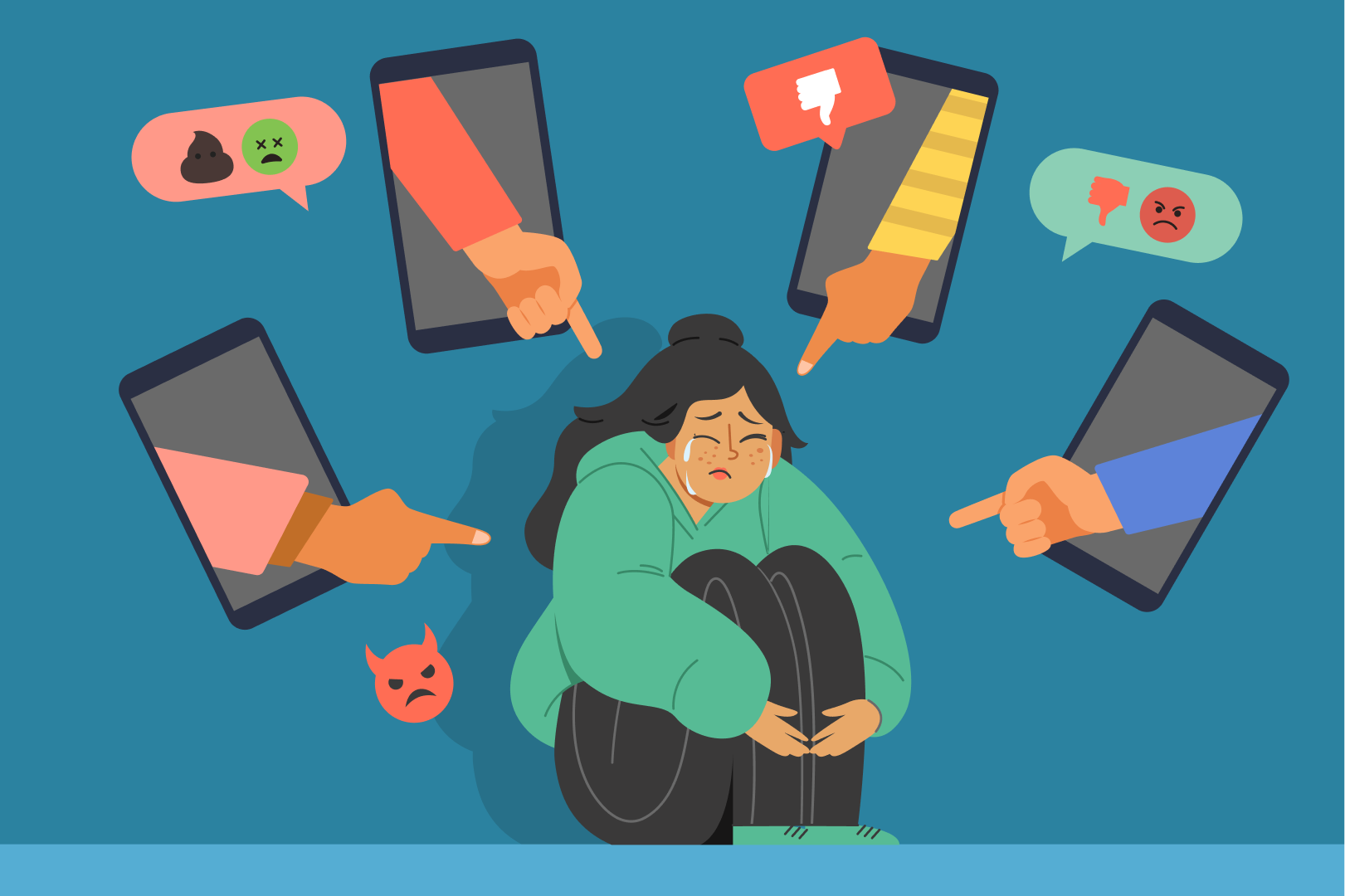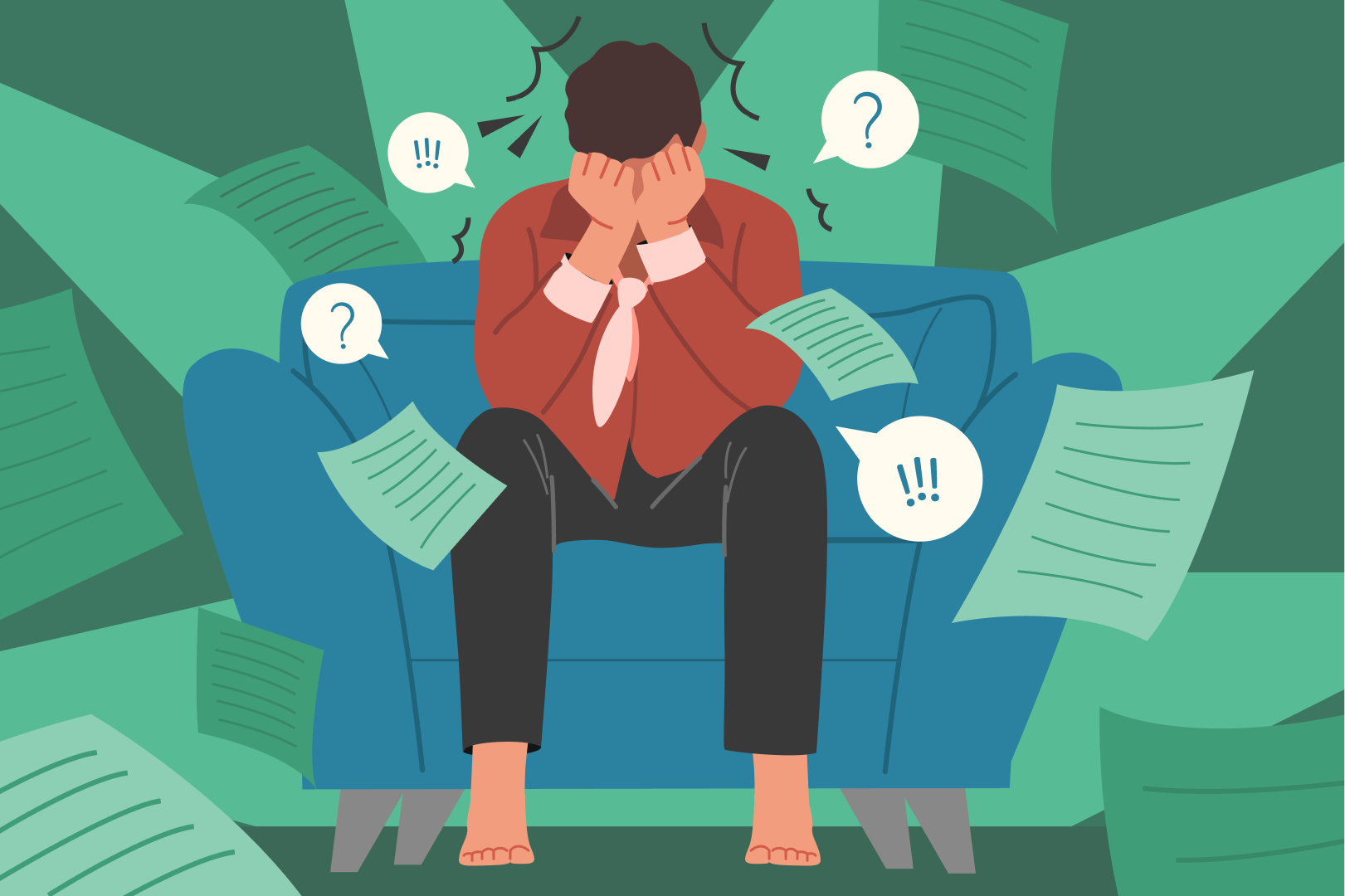Understanding who you can count on is a key social and emotional skill we can teach early and reinforce through high school. Students benefit from knowing who is in their support system, when to access them, and how to access them.
Who Can I Count On?
When talking about a support system, you want to go beyond just a list of reliable people. Have students sort people by where they see them (e.g., community, home, school), the type of relationship they have with them, and the kind of help they can provide.
Support Circles
You can have young people think about who they can rely on a bit more deeply by considering the closeness of their relationship or the kinds of problems they would go to them for. Concentric circles are a simple and quick way to have students explore their support system.
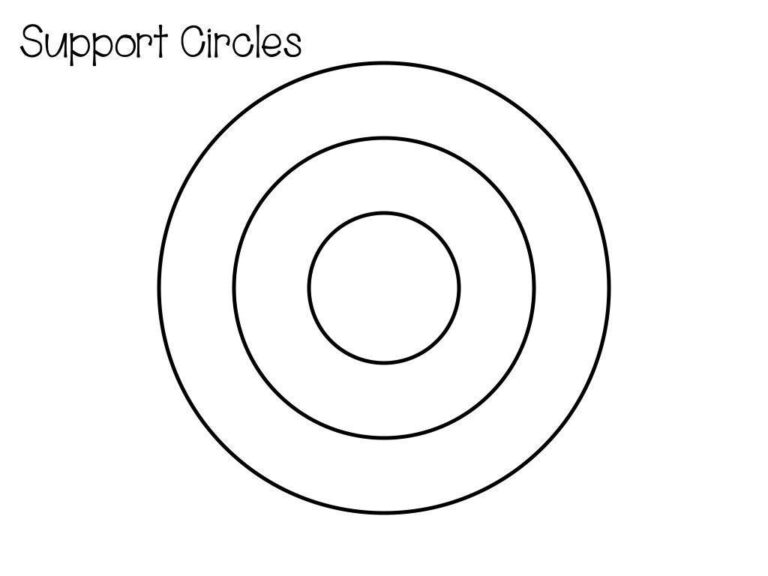
For example, you can rate how big the problem is by coloring in the circle. Small problems may just be the center circle and it would continue to expand as the problem got bigger. Then you could add people that you would go to for small, medium, and big problems.
Add yourself to the center and then add people to the circle. The closer the relationship they have with that person, the closer that person would be to them on the diagram.
When Do I Need Support?
It’s great for students to understand who is in their support system. It is even better that they know when to access those people.
Support systems are important and you should know who you can count on. But if you don’t know when or how to access them, it isn’t as valuable as it should be.
Kid Fix Problems vs Adult Fix Problems
Most students are usually struggling with some problem they didn’t know how to solve on their own. Over time, this would quickly blow up into bigger problems. Their approach was to either over-rely on adults or to try to fix all the problems on their own.
One of the first things we did was to list the problems they were having. Then we rated them on a simple scale.
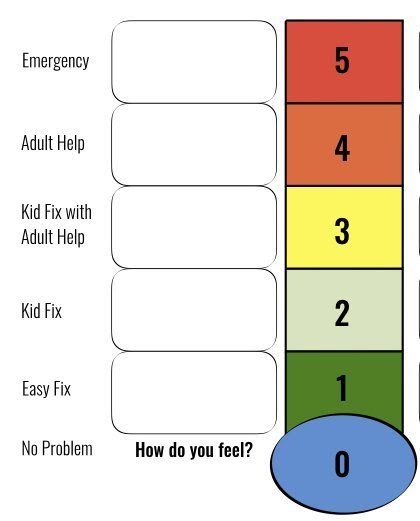
- No Problem – Something to let go.
- Easy Fix – problems with super easy solutions.
- Kid Fix – problems that adults and others expect kids to fix by themselves.
- Kid Fix with Adult Help – problems that kids are in charge of, but adults might be able to help solve it smoother or quicker.
- Adult Help – problems kids should not fix on their own, but rather ask an adult to fix.
- Emergency – problems that need to be solved immediately by an adult.
You can link this to their support system by having a student identify a scenario and who to rely on in each situation.
It is also important to talk about the consequences of over-accessing your support system, as well as the benefits of being independent when poss
For young people, the biggest trigger for causing depression, research reveals, is loneliness. While young Indians now chase individual aspirations, the need for a collective consciousness, or the acknowledgement of the role of the society and community around us must be remembered during this pursuit. The WHO definition of mental well-being, in fact, also includes the ability to “contribute to the community” as a key indicator of wellness.
However, today in India young people are physically and mentally distancing themselves from families and societies to pursue their goals. The increasing prevalence of nuclear families in India (88% of families only have 3-4 members), coupled with child-rearing practices that indicate primary focus on “success”, “being in a position” and minimum tolerance for problems render him or her incapable of being at peace. The typical child or adolescent is taught only to study, “get marks”, and “grow in life”, without being taught how to behave and how to handle crises.
Indian society is inherently prone to placing conventional pressures on children. A key cause for this is parental anxiety as most Indian parents want their children to take up career paths that guarantee a six-figure starting salary, or get their children married off before they die. However, it also remains a concern that children succumb to such pressure and do not try to convince their parents of their ability to take the less-trodden path or to choose a partner of their liking, which is a result of upbringing that doesn’t provide pointers on how to deal with controversies. However, resentment is an unavoidable residue, which makes young adults frustrated, anxious, and ultimately, depressed.
How do we work to prevent this? Counselling and treatment are of course good options to consider, but then again, there is not even one psychiatrist per 1,00,000 people in India. Prioritising the needs of young people who are on the brink of depression or displaying behavioural issues indicative of poor mental wellness also needs to be looked at urgently, and hence, the involvement of the family and community is essential. In fact, Indian families are sources of support, encouragement, and emotional strength for even the mentally ill – keeping this in mind, it might even be the case that they are potentially untapped avenues to preventing a person from falling into depression.
While considering this, an important thing to remember is that support systems for fighting depression and other conditions are not tailor-made. Families cause as many problems as they heal them, and in the end, it boils down to an individual’s ability and willingness to take only the good. Most of India’s young population is on the edge, trying in vain to create a life which they are destroying their peace for. Wellness is within their reach – in fact, only a phone call away. But, what proportion of this youth is ready to make that call to their well-wishers, fully knowing that it will involve both valuable guidance and traditional views? How many of them are brave enough to absorb the concern behind a family/society’s “interference” and ignore the rest? How can they be taught to merge original Indian culture (that of collectivism) with the present, so that individual aspirations go hand in hand with rational advice from the previous generation? These are the questions that advocacy and research need to focus on – and answers to these are what the Indian youth – possibly, even the global youth has to understand and practice to move closer to being completely well.
NATIONAL TOLL FREE DRUG DE-ADDICTION HELPLINE: TEL : 1800-11-0031
TOBACCO QUIT HELPLINE : – 1800-11-2356
( Timings : 8am to 8pm ) or Give a missed call on 011-22901701 for registration.
INDIA SUICIDE & STRESS HELPLINE
( Feeling Alone : Depressed : There is someone to listen to you )
1. Jeevan Aastha Helpline :
Toll Free : 1800 233 3330 ( Verified )
( 24 * 7 available , operated by Gandhi Nagar Gujrat Police in association with physcologist : VERIFIED : SUICIDE , DEPRESSION , CAREER COUNCELLING , ADDITION )
WEBSITE : http://www.jeevanaastha.com/
EMAIL : help@jeevanaastha.com
2. AASRA :
Helpline: 09820466726
( Language : Hindi and English )
Website : http://www.aasra.info/helpline.htm
3. COOJ Mental Health Foundation ( GOA ) :
CALL : 0832-2252525 ( Verified )
LANGUAGE : ENGLISH ( ONLY )
TIMINGS : 1pm to 7pm : Monday to Friday
4. VANDRAVELA FOUNDATION –
Telephone : 18602662345 and +91-9999666555
Email : help@vandrevalafoundation.com
Note : 24 hours is standard time for email reply
All days 24*7 , Language : Hindi , English , Gujrati ( Verified )
5. KIRAN MENTAL HEALTH ( GOVT ) –
Helpline: 18005990019
Timings : 24hours, Government Helpline
( The purpose is to resolve the issues faced by the people experiencing anxiety, depression, stress, panic attack, post-traumatic stress disorder, adjustment disorder, suicidal thoughts, substance abuse, mental health emergency, and pandemic induced psychological issues )
6. One Life Foundation :
Helpline: 7893078930
Timings : Monday to Saturday : 10am to 6pm ( Verified )
Language : English , Hindi , Tamil
7. SANJIVINI : ( DELHI )
Centre 1 ( Jangpura NewDelhi : 011-24311918 , 011-24318883 , 011-43001456 ( 10am to 5.30 pm : monday to friday )
Centre 2 ( Qutub Institutional Area ) : 011- 40769002 , 011-41092787 ( 10am to 7.30pm : Monday to Saturday)
Website : http://sanjivinisociety.org/
8. SUMAITRI :
Helpline: 011-23389090 ( NEWDELHI )
Timings : 2pm to 10 pm weekdays and sat and sun – 10am to 10pm
9. FORTIS STRESS
HELPLINE : +91-8376804102
All Days 24*7 , Over 15 languages ( Verified )
10. Parivarthan Counseling
Helpline Services : 7676602602
Timings : 4pm to 10pm , Monday to Friday
11. ICALL ( Operated by TISS ) –
Helpline: 022-25521111 and 9152987821
( 10am to 10 pm : monday to saturday )
Website : http://icallhelpline.org/
12. Roshni Foundation ( Secundrabad )
Helpline: 040-66202001 , 040-66202000
TIMINGS : 11am to 9pm Monday to saturday
13. MITRAM FOUNDATION ( BENGALURU ) –
Helpline: 080-25722573
Timings : 10am to 2pm , Monday to saturday ( Verified )
Languages : ENGLISH, HINDI (ALL DAYS EXCEPT SUNDAY)
ENGLISH, HINDI AND KANNADA (WEDNESDAYS)
14. India: International Bipolar Foundation :
CALL : +91-8888817666
15. Arpita Foundation :
Helpline: 080-23655557 , 080-23656667
Mon to Sun , 07am to 9 pm ( Verified )
Language : Multiple languages based on chart on the website
Website : http://arpitafoundation.org/
16. LIFELINE FOUNDATION ( KOLKATA ) :
CALL : 033-24637401 , 033-24637432
Timings : 10am to 6pm , Monday to sunday
Website : https://lifelinefoundation.co.in/
17. HITGUJ
Helpline ( MUMBAI ) : 022-24131212
( 24 HOURS HELPLINE , OPERATED BY KEM HOSPITAL IN ASSOCIATION WITH MUMBAI MUNICIPAL CORPORATION [ M.C.G.M ] )
18. National Institute of Behavioural Sciences
( KOLKATA ) : 033-22865203
Timings : 12pm to 8pm ( all days except government holidays )
19. ASHA
Helpline ( Chandigarh ) : 0172-2735436 , 2735446
Timings : 8 am to 7 pm ( Monday to saturday )
20. SAATH ( AHEMDABAD ) :
Helpline: 079-26305544 , 079-26300222
Timings ( 1pm to 7pm daily )
21. Healing Minds Foundation ( SRINAGAR ) –
Helpline: 18001807020
Timings : 10am to 5 pm ( sunday to thursday )
22. The Sara ( Jammu Tawi ) :
Helpline: +91-9697-606060
Email : mail@thesara.org.in , Timings : 10am to 5pm
23. Jeevan Suicide Prevention
Helpline ( Jamshedpur ) : 0657-6453841 , 0657-6555555
Timings : 10am to 6pm daily
24. DISHA (KERALA ) –
Helpline: 1056
25. NGO SPACE : LGBT
TRANSGENDER COMMUNITY HELPLINE : 1800111015
26. TAMIL NADU SCHOOL STRESS
HELPLINE : 14417
27. SNEH FOUNDATION ( 8 AM TO 10PM ALL DAY ) :
Helpline: 044-24640050
Website : https://snehaindia.org/
28. CALL : 104
( IN PUNJAB , JHARKHAND , CHATTISHGARH , ASSAM , JHARKHAND , KARNATAKA AND MANY OTHER STATES )
29. Spandan : 7389366696
All days of week 24/7 , English and Hindi ( Verified )
30. CAN – HELPLER :
( expert counsellors who will offer relief from cancer-related anxiety, depression and stress. Operated by Tata Memorial Center , Mumbai )
CONTACT : 09511948920
All days of the week from 10 am to 6 pm in English, Hindi and Marathi.
31. Mann Talks Helpline : 8686139139
Timings : 9am to 6pm , Monday to sunday
Language : English , Hindi , Marathi
Webiste : http://manntalks.org/
ORGANIZATIONS PROVIDING OPEN PALTFORM AND FREE ADVISORY :
1. FREE EMAIL BASED HELPLINE : BY SWITCHINDIA.ORG
- FREE EMAIL SUPPORT
- Personalized Response Within 24-48HRS
- Anonymous ( no need to give your name / details )
- Confidential
Email Now: insideout@switchindia.org
Report Cybercrime:
https://cybervolunteer.mha.gov.in/webform/Volunteer_AuthoLogin.aspx
